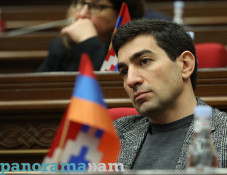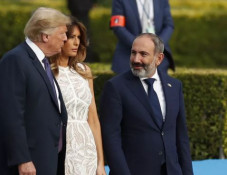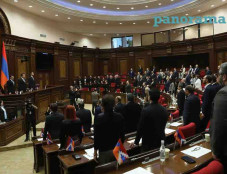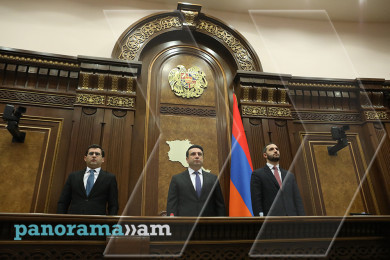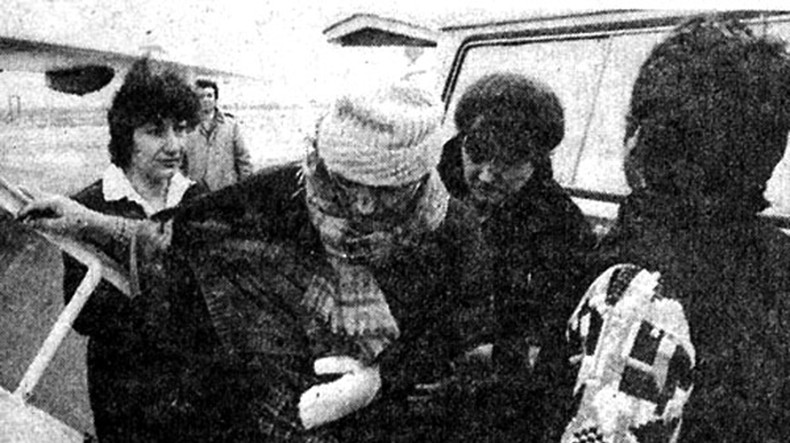
General Provotorov about Baku events in January 1990: Defeated in January 20 clashes, Azerbaijani extremists took up acts of terrorism
Below we present the continuation (Part 3) of Major General of justice V. G. Provotorov’s article titled ‘Baku: The Beginning of the Nineties,’ which was published in ‘Military and History Journal’ No 7 in 1990.
Provotorov writes, “Efficiently assessing the circumstances, the commanders of the subdivisions and military units changed the tactics of fighting against the militants and snipers in order to rule out any death of innocent people. Mobile units to seize them were created, and they acted prudently and professionally. They penetrated into the attics of the buildings and conducted single-shot fire only as a response to the extremists’ shooting. The militants did not retreat after the breaching of the barriers, either. Members of new bandit groups, which were quickly thrown in from different ends of the city, were already shooting at any soldier they saw.”
Another undeniable fact, proved by the data of the forensic medical examination, exposes the extremists’ meanness and perfidy: Five soldiers killed in those days were shot at the back, actually point-blank, when they were tying up the equipment behind the ‘barricade’-blocs for carrying it out with tanks and tractors.
“The soldiers’ use of arms, especially en masse, against the civilians is out of the question. These are all provocatively invented stories. The troops demonstrated self-control and self-possession in most difficult situations. They often exposed themselves to the firing to protect the citizens,” the author writes. He notes the actions of the troops of the landing operation under officer Y. A. Naumov’s command. Finding a powerful barrier at entering Baku from the southern side, they took it in an attack on foot, without a single shot. They seized over 70 armed militants who were conducting a massed fire against the personnel. The other part, which was advancing from the side of the military aerodrome, used only 258 shells during the break-through, a figure stated in a due document. They shot them upwards from the open hatches of the BMD (‘Combat Vehicle of the Airborne’) to disperse the militants’ organised groups. Even dilettantes in military affairs will understand that it is impossible to hit people in front of a troop’s convoy by firing from open hatches. Only those on the roofs of high buildings could be killed.
Meanwhile, the extremists implemented savage methods of fighting. For example, they speeded up heavily-loaded vehicles towards the convoys and lines of soldiers and jumped out of the accelerating lorries. They poured petroleum products around and burnt them up, as well as the barriers of car tires, which they had previously poured over with oil, petrol and mazut. They threw incendiary bottles and self-made and military explosives at people and equipment.
After being defeated in January 20 clashes, the extremists took up acts of terrorism practically across the entire city: they were shooting at the posts and moving convoys, as well as at separate cars. An active shelling of military detachments was conducted from vehicles, including from those marked as ambulance.
Provotorov writes that the extremists subsequently used any possible method to unleash terror against the soldiers. In numerous cases, vehicles hit soldiers and officers in Baku. A GAZ-24 car without number plates deliberately hit a soldier of military troops; two soldiers and a marine sergeant were severely injured as a result of being deliberately hit by the driver of ZIL-130.
The extremists were no less zealous and cruel in hindering the reserve soldiers’ return to their homes, although they had themselves achieved the decision about the formers’ withdrawal from Baku and Azerbaijan. The convoys of the vehicles, which took them to aerodromes, were under a constant fire, because of which human blood was spilled again. Three people among the ones leaving were killed only on 22 and 23 of January.
According to the information, there were cases of deaths and injuries among those who carried out the evacuation of the soldiers’ families in that period, as well as among the Russian-speaking citizens who wanted to leave. No response fire was opened during the shelling of the peaceful convoys in order to avoid aggravating the situation and exposing women and children to unnecessary danger. Moreover, they were seated in the centre of the bodies of the vehicles and the soldiers sat in the side seats covering the evacuated people with their bodies to reduce the risks to their lives.
The inhumane nature of the anti-national forces also was displayed in their actions in the sea. As mentioned above, about 50 units of ships of Caspmorenefteflot concentrated in Baku Bay to block the waterway. This came as a grave violation of the international navigation rules, which subjected shipping inside the bay and near it to real risk. Those actions, qualified as criminal by the international sea law, were carried out purposefully and maliciously. Admiral V. V. Sidorov, the deputy commander-in-chief of the Navy, received a delegation of captains of civil ships on 21 January and tried to settle the conflict peacefully. In return, the ‘delegates’ said that they would not allow the flotilla ships into the sea and that in case their crews attempted to free the barriers, they would set the oil-tankers and reservoirs with petroleum products to fire on the coast. The delegation members were warned that the research vessels of the flotilla would evacuate women and children.
The captains did not object to that. However, when the vessels set into the bay, the ships of the Caspneftemoreflot attacked them. This was done despite the fact that the duty officer of the flotilla had reported the motor ship Orujev about two research vessels’ departure from the bay. It was reported on January 21 at 17:00 o’clock, but the answer was given only one day later, and it was a negative one. Orujev finally gave OK to the research vessels’ departure after radio negotiations, and they swam away from the pier in 10 minutes.
However, the Major General writes that their calm swimming lasted short. Neftegaz – 10 weighed anchor after them and rushed in full speed toward the research vessels. The duty officer managed to inform the vessel commanders about that and they returned to the base dodging the ram. On their second attempt, they went underway under the protection of a missile boat.
Still, it was already difficult to stop the inflamed extremists. Even the attempts to prevent the criminal action made by many of their ‘allies’ – the captains of the ships taking part in the blockade of the barrier – did not help. At seeing that Neftegaz – 10 intended to ram the research vessels, they shouted angrily in the radio, “Is this a provocation?... You should not ram!...”
Meanwhile, Orujev ordered, “Appointed ships, ram!” And the extremists did that. Neither the warning that a fire would be opened at the criminals in case they got dangerously closer, nor the precautionary shots into the air stopped them. It were only due to the skills of the vessels’ commander that the 167 lives were saved, though the ship was significantly damaged. The provocations in the sea, however, did not stop. At 21:07 on the same day, a radio message of the ship Baba-zade was caught, which informed that the captain of the ship had a task to ‘take the hostages,’ that is, to seize the two research vessels and the missile boat. The decisive actions of the military sailors were able to prevent the irresponsible step.
Provotorov writes that the soldiers displayed self-control and generosity despite the provocations and cruel treatment to them, convincingly exemplified by the liberation of the station and the ship Orujev, where the PFAz activists were concentrated. Notably, none of the PFAz activists was killed, while many troops of the landing operation received injuries of various degrees as a result of their machine-gun-fire (it was conducted from the ships Vodoley – 4, Neftgaz – 30, Soukhona).
“There is no reason to complain of the soldiers and of the main part of the locals. Moreover, the residents of Baku and other settlements have more than once expressed their gratitude to the personnel of the military subdivisions for the help and support,” Provotorov highlights.
The leaders of the PFAz, driving the people into bloodshed, did not suffer in any other place of military action, either. They preferred to escape the responsibility before their fellow citizens and the law either in remote districts of the republic, or in other cities of the country. For example, one of those hiding was N. Panakhov, one of the most implacable leaders of the extremist, with the trace of the criminal activities behind him going back to 1988.
Putting forward nationalistic slogans, the ‘republicans’ like Panakhov were playing the hypocrite. Their main aim was to infuse passions and seize the power rather than to settle down the interethnic issues. For example, they blocked and shelled the territory and the building of Baku Higher Joint Command College without taking into consideration the fact that representatives of the native population constituted a significant part of the cadets. Captured with excessive ambitions, blinded with hatred, they conducted a mass fire at the ‘object’ without differentiating between ‘friends’ and ‘foes.’ A similar situation had unfolded in other places, as well, where representatives of Azerbaijani military personnel, Praporshik T. S. Salamov, private soldier M. A. Gaziyev and others were injured by their infuriated compatriots, and Senior Praporshik O. S. Akhundov and private soldier M. S. Mammadov were killed. Everyone in military uniform was considered the extremists’ enemy because of hindering them to carry out their power-seeking and mafia-like plans.
To be continued.
A mass pogrom of Armenian population was committed in Baku from 13 to 19 January 1990 as a culmination of the genocide of the Armenians in Azerbaijan unfolded between 1988 and 1990. After the Sumgait pogroms (26-29 February 1988), persecutions, beatings, particularly cruel killings, public mockeries, pogroms of separate flats, seizure of property, forcible expulsions and illegal dismissals of Armenians started in Baku. Only some 35 or 40 thousand Armenians of the community of 250 thousand remained in Baku by January 1990; they were mainly disabled people, old and sick people and the relatives looking after them. The pogroms took an organised, targeted and mass nature since 13 January 1990. A large amount of evidence exists about the atrocities and killings committed with exceptional cruelty, including gang rapes, burnings of people alive, throwing people out of balconies of higher floors, dismemberments and beheadings.
The exact number of the victims of the genocide of the Armenians in Baku still remains unknown. According to different sources, between 150 and 400 people were murdered, and hundreds were left disabled. The pogroms went on for a week amid a total inaction of the authorities of Azerbaijan and the USSR, as well as the internal troops and the large Baku garrison of the Soviet Army. Those who managed to avoid death were forced into deportation. The Soviet troops were deployed to set order in Baku only on 20 January 1990.
For more detail, visit KarabakhRecords
Related news
- 26 years after genocide of Armenians in Azerbaijan: “I spent two years in hostage, in nightmarish conditions”
- 26 years after genocide of Armenians in Azerbaijan: “I remember Baku and again feel smell of burnt human flesh…”
- “This is impossible to forget and to forgive”: A Century-Long Genocide. Black January of Baku film demonstrations in US
Newsfeed
Videos





